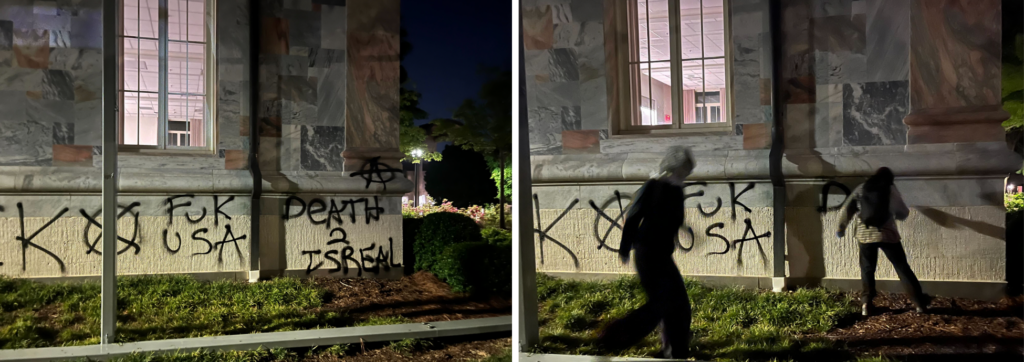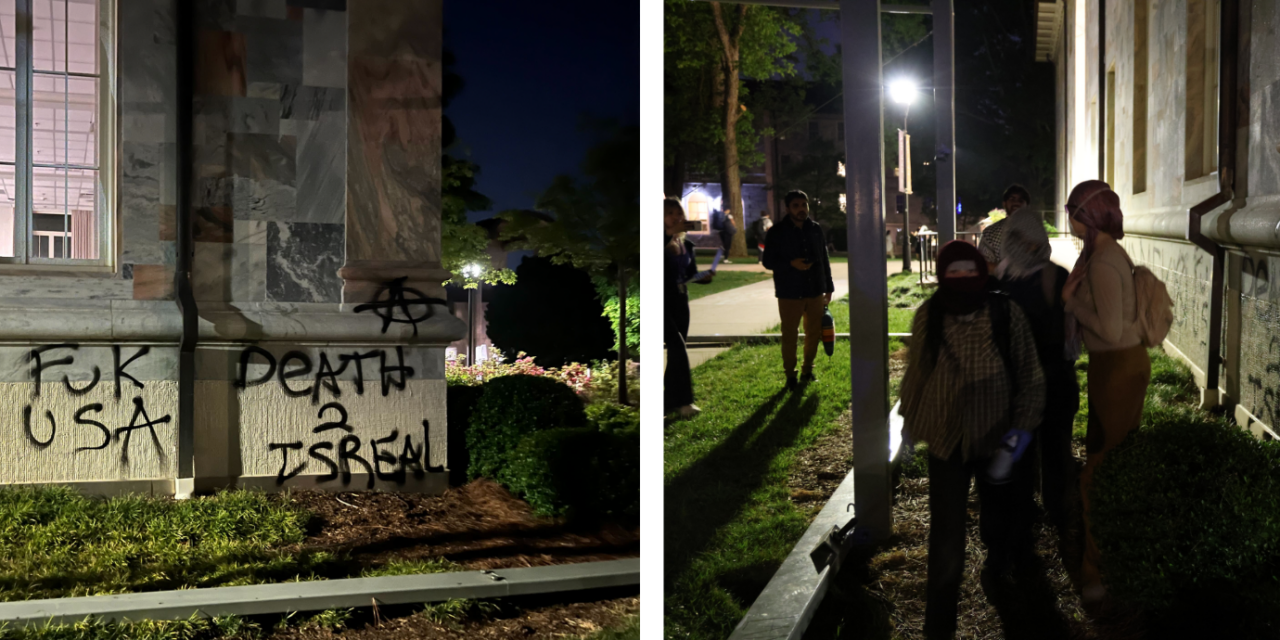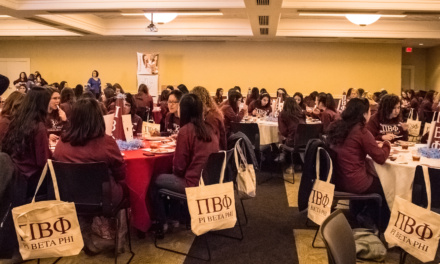Content Warning: This article contains references to suicide and hateful language directed at minority groups.
Emory University’s Student Government Association (SGA) voted 10-2 on a resolution late yesterday evening to condemn the “antisemitic messages” that unknown individuals spray painted on campus structures last week. These messages included “DEATH 2 [ISRAEL],” “LAND BACK” and “FUK USA” on Convocation Hall and “of genocide” below Emory’s name on the marble sign near the Haygood Hopkins Gate.
Emory-Israel Public Affairs Committee President Sophie Kalmin (26C) presented the resolution at SGA’s emergency meeting, which started at 10:30 p.m. yesterday and lasted past midnight. Ranking Member Sohan Bellam (26C) and Legislator Sophia Rubinstein (26C) wrote the bill with Kalmin.
Bachelor of Business Administration Legislator Ibrahim Jouja (22Ox, 25C) asked Kalmin why the graffiti was characterized as antisemitic when the messages were anti-Israel. Kalmin responded that the graffiti was antisemitic because it included the word “death” in reference to Israel.
A speaker who presented themselves as a “student” said that connecting Israel to Judaism may be “dangerous.” However, Kalmin responded that there is a link between Israel and Judaism.
“There is a reason a vast majority of American Jews feel this way,” Kalmin said.

Three unidentified protestors spray painted the side of Convocation Hall. The protestors are not affiliated with Emory University, according to Vice President of Communications and Marketing Luke Anderson. (Clement Lee/Managing Editor)
Jouja said he fears that passing this resolution could create a precedent that anyone, such as himself, who criticizes Israel will be seen as antisemitic.
Second-year Legislator Seth Weinfield (26C), who is Jewish, said Jewish students have told him that they are uncomfortable on campus.
“There’s a lot of uncomfortability within the Jewish community, and we need to alleviate that to the best of our abilities,” Weinfield said. “This resolution does so in a very impactful way.”
SGA ultimately shared their condemnation with students on social media.
As the meeting went later into the night, SGA opened discussion on a second resolution, which aimed to condemn antisemitism across campus. However, SGA ultimately tabled the resolution.
Peer Advocate Office Director Harleigh Markowitz (25C) wrote the resolution, which states that posters advocating for Hamas to release Israeli hostages have been repeatedly torn down and student groups have invited “known antisemites and Holocaust deniers” to speak at Emory, in reference to Norman Finkelstein, who is publically critical of Israeli policy. Eight student organizations invited Finkelstein to speak at the Emory School of Law on April 28, but he ended up refusing to participate after another speaker said students were “silencing” conservative commentator Jackson Hinkle.
The resolution also states that several Jewish students feel unsafe on campus, with some reporting that they have been assaulted and harassed due to their identity, including one student claiming that she was told to “kill herself” because she was Jewish. Additionally, the resolution notes that a Jewish member of University administration has been depicted as a pig in drawings across campus.
The resolution states that Emory student leaders must uphold the principles of diversity, equity and inclusion, which are “essential to academic excellence and both personal and institutional integrity.”
If the resolution is passed, SGA will share a message on social media stating that the group is “deeply concerned” about the rise in antisemitic incidents at Emory. The proposed statement also notes that SGA rejects all forms of hatred targeting Jewish people.
“These acts of hatred and bigotry create a hostile environment for Jewish members of our community and are absolutely unacceptable,” the statement reads. “We unequivocally condemn antisemitism on Emory’s campus.”
However, SGA ultimately tabled Markowitz’s resolution after students raised concern about issuing statements condemning antisemitism without doing the same for Islamophobia. A student who identified herself as Maha said not addressing Arab and Muslim students’ experiences on campus may divide Emory. Another student expressed a similar sentiment, saying Muslim students across Emory feel unsafe and that SGA needs to address Islamophobia.
In a statement to the Wheel, Markowitz wrote that she is “incredibly disappointed” that the SGA legislature did not vote on a resolution to condemn antisemitism on campus.
“Jewish students are hurting right now,” Markowitz wrote. “Their pain deserves to be recognized. The refusal to vote on the condemnation of antisemitism makes their stance loud and clear.”
If you or someone you know is having thoughts of suicide, you can call Student Intervention Services at (404) 430-1120 or reach Emory’s Counseling and Psychological Services at (404) 727-7450 or https://counseling.emory.edu/. You can reach the Georgia Suicide Prevention Lifeline 24/7 at (800) 273-TALK (8255) and the Suicide and Crisis Lifeline 24/7 at 988.
If you or someone you know experienced hateful language or slur use, you can call the Emory Police Department at (404) 727-6111 or reach Emory’s Counseling and Psychological Services at (404) 727-7450 or https://counseling.emory.edu/. You can reach the Atlanta Police Department at (404) 614-6544
Spencer Friedland (26C) is from Long Island, New York and is the Emory Wheel's Managing News Editor. He is a Philosophy, Politics and Law major and has a secondary major in Film. Spencer is also a part of the Franklin Fellows program at Emory.




